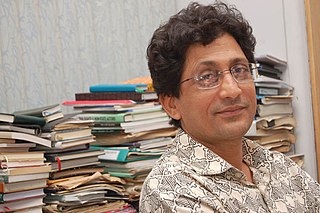Related Research Articles

Dhaka College is the oldest secular educational institution of Bangladesh located in New Market, Dhaka 1205. It offers higher secondary education (HSC). It has Honours and Masters programs as well which are affiliated with the University of Dhaka.

Ashok Gadgil Is the Andrew and Virginia Rudd Family Foundation Distinguished Chair and Professor of Safe Water and Sanitation at the University of California, Berkeley. He is a Faculty Senior Scientist and has served as director of the Energy and Environmental Technologies Division at Lawrence Berkeley National Laboratory.
The Grainger challenge is a scientific competition to find an economical way to remove arsenic from arsenic-contaminated groundwater. This competition is being funded by the United States National Academy of Engineering and the Grainger Foundation and is meant to help provide safe drinking water to countries such as Bangladesh, India, and Cambodia.

Arsenic contamination of groundwater is a form of groundwater pollution which is often due to naturally occurring high concentrations of arsenic in deeper levels of groundwater. It is a high-profile problem due to the use of deep tube wells for water supply in the Ganges Delta, causing serious arsenic poisoning to large numbers of people. A 2007 study found that over 137 million people in more than 70 countries are probably affected by arsenic poisoning of drinking water. The problem became a serious health concern after mass poisoning of water in Bangladesh. Arsenic contamination of ground water is found in many countries throughout the world, including the US.
The Sono arsenic filter was invented in 2006 by Abul Hussam, who is a chemistry professor at George Mason University (GMU) in Fairfax, Virginia. It was developed to deal with the problem of arsenic contamination of groundwater. The filter is now in use in Hussam's native Bangladesh.

Presented annually since 1991, the Stockholm Water Prize is an award that recognizes outstanding achievements in water related activities. Over the past three decades, Stockholm Water Prize Laureates have come from across the world and represented a wide range of professions, disciplines and activities in the field of water.

With abundant water resources, Bangladesh faces various water contaminations mainly caused by pollutants, bacteria, and pesticides. Historically, water sources in Bangladesh came from surface water contaminated with bacteria. Drinking infected water resulted in infants and children suffering from acute gastrointestinal disease that led to a high mortality rate. According to UNICEF, 38.3% of Bangladeshis drink unsafe water from bacteria-contaminated sources. Bangladesh is facing an acute reliable drinking water scarcity. Bangladesh's surface and ground water are highly saline due to rising sea levels.

Bengali Americans are Americans of Bengali ethnic, cultural and linguistic heritage and identity. They trace their ancestry to the historic ethnolinguistic region of Bengal region in the Indian subcontinent, now divided in South Asia between Bangladesh and West Bengal of India. Bengali Americans are also a subgroup of modern-day Bangladeshi Americans and Indian Americans. Bengalis are also classified under Bangladeshi Americans. Significant immigration of Bengalis to the United States started after 1965.

Abul Barkat is a Bangladeshi economist and a professor in the Department of Economics, University of Dhaka. In addition to his teaching, from 2009 to 2014 he was the former chairman of Janata Bank Ltd. He is the present elected president of the Bangladesh Economic Association. He is a freedom fighter.

M. Feroze Ahmed achieved excellence in teaching, engineering profession and scientific research and earned national and international recognition and awards as an eminent professor, civil engineer and scientist. He is the former vice-chancellor of Stamford University Bangladesh.
John A. Cherry is the recipient of the 2016 Lee Kuan Yew Water Prize, awarded at Singapore International Water Week in July 2016 for his work in groundwater research, protection and management. In 2020, Cherry received the Stockholm Water Prize. He is a Distinguished Professor Emeritus from the University of Waterloo in Ontario, Canada. He undertook research on the migration of contaminants in groundwater and he participated in the development of technologies for groundwater monitoring and remediation thus "revolutionizing groundwater research". His research resulted in a "paradigm shift in groundwater pollution control measures", leading to new groundwater remediation guidelines to be adopted in the United States and other countries in the 1990s.

Bangladesh, with an area of 147,570 km2, features a flood plain landscape and several river systems throughout the country. This landscape provides the major natural resources of water, land, fisheries, forests, and wildlife. The country currently faces several environmental issues which threaten these resources, including groundwater metal contamination, increased groundwater salinity, cyclones and flooding, and sedimentation and changing patterns of stream flow due to watershed mismanagement. Some of these, such as the changing patterns of stream flow and presence of lead in groundwater, can be directly correlated with human activity and industrial processes, while others, such as cyclones and flooding are naturally occurring issues. Many of these issues are further exacerbated by climate change, which causes increased occurrence of storms and cyclones and rising sea levels. According to the Notre Dame Global Adaptation Index, Bangladesh is the 43rd most vulnerable country to the effects of climate change, and the 37th least prepared country to address these effects. There has been some government actions taken to address these issues.

Janet Gordon Hering is the former Director of the Swiss Federal Institute of Aquatic Science and Technology and Professor emeritus of Biogeochemistry at ETH Zurich and EPFL. She works on the biogeochemical cycling of trace elements in water and the management of water infrastructure.

Syed Safiullah was a Bangladeshi academic of Chemistry. He was a professor in the Faculty of Mathematical & Physical Sciences at Jahangirnagar University (JU), Bangladesh. He was widely recognized for his research and innovation of Shushama fertilizer and fish feed, Safi Filter, and Safi Fuel. Among other positions, he was the former professor of chemistry and founder chairperson of environmental sciences department and Institute of Life Science at Jahangirnagar University (JU). His areas of interest covered environmental, material, synthetic, and applied chemistry. Safiullah is known for his work on arsenic pollution investigations, organic matter characterizations and environmental chemistry.

Abhijit Mukherjee is an Indian professor, scientist and currently Professor of Geology and Geophysics and the School of Environmental Science and Engineering of IIT Kharagpur. He has been selected for Shanti Swarup Bhatnagar Prize for Science and Technology in 2020 in the field of Earth Atmosphere Ocean and Planetary Sciences.
References
- ↑ The Mason Gazette, Hussam at Work to Curb Arsenic Poisoning in Bangladesh Archived 11 May 2008 at the Wayback Machine , 16 June 1999.
- 1 2 3 Professor Wins $1 Million Prize for Providing Clean Water, One Village at a Time Archived 11 March 2007 at the Wayback Machine , Associated Press, 2/3/07.
- ↑ National Academies Press Release, accessed 5 February 2007.